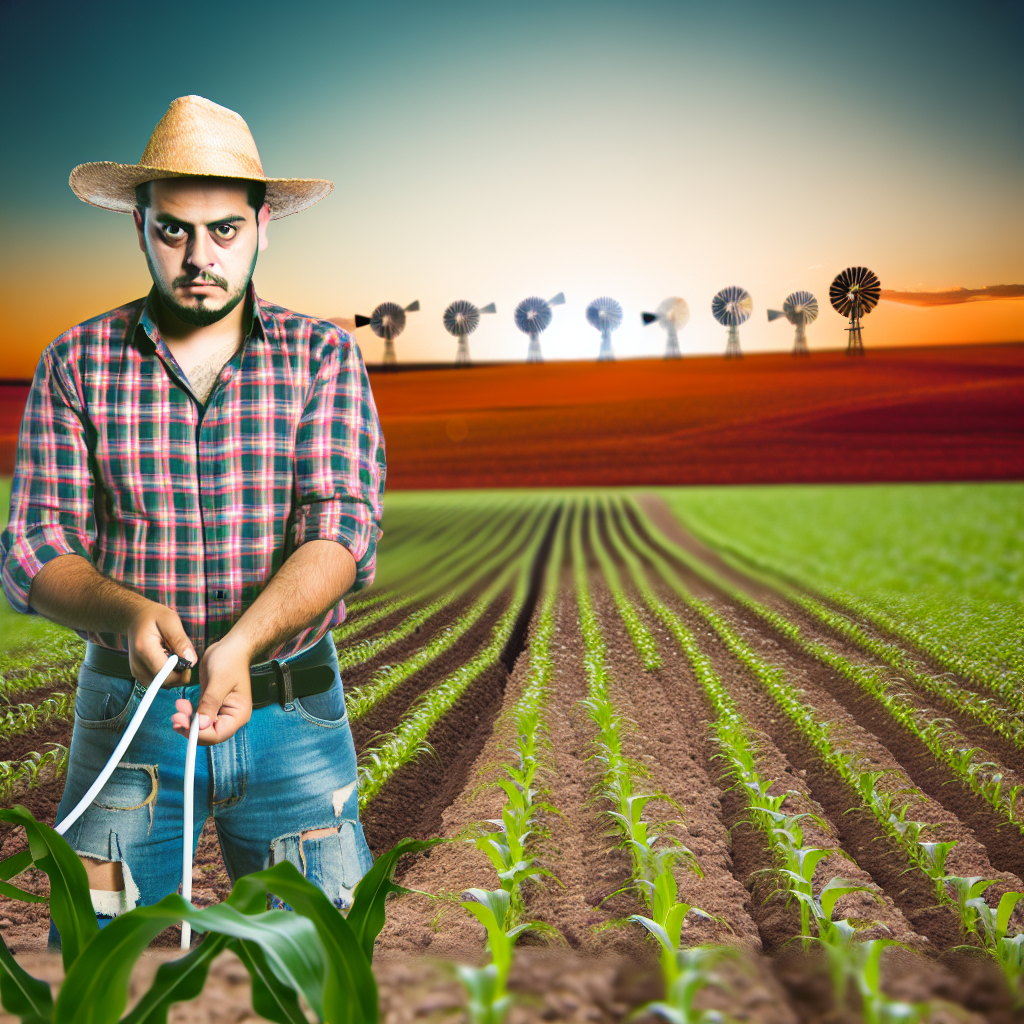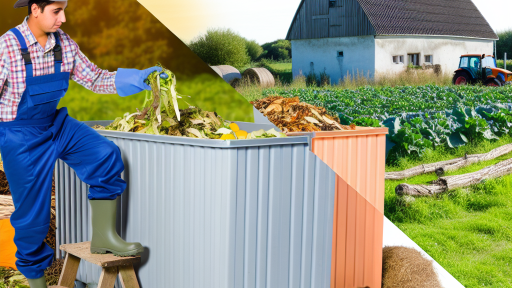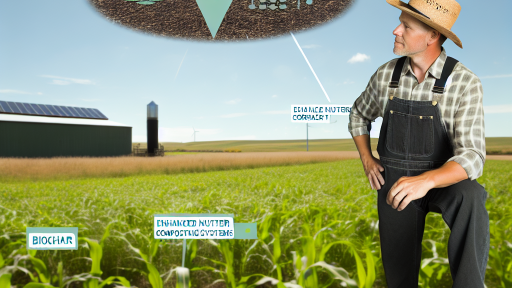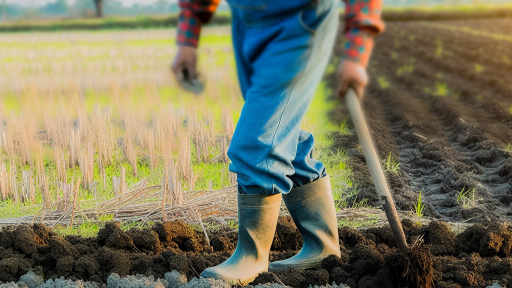Introduction to Organic Water Conservation
Importance of Water Conservation
Water conservation is vital for sustainable agriculture.
Farmers face increasing water scarcity due to climate change.
Effective water management enhances crop yields.
Moreover, it reduces dependency on external water sources.
Economic Benefits for Farmers
Implementing water conservation methods can lower costs.
Farmers can save on irrigation expenses through innovative techniques.
Increased efficiency translates to higher profit margins.
Furthermore, it minimizes the risk of crop failure during droughts.
Environmental Advantages
Organic water conservation helps maintain local ecosystems.
It protects groundwater resources from depletion.
This practice also promotes soil health and fertility.
Consequently, it fosters biodiversity and habitat protection.
Community and Social Impact
Water conservation methods create a positive community impact.
Farmers who practice conservation share knowledge with peers.
This exchange promotes sustainable practices in the community.
Transform Your Agribusiness
Unlock your farm's potential with expert advice tailored to your needs. Get actionable steps that drive real results.
Get StartedMoreover, it helps ensure water availability for future generations.
Understanding the Water Cycle in Agriculture
Role of Water in Agriculture
Water plays a vital role in agriculture.
It influences crop growth and soil health.
Farmers rely on water for irrigation and livestock.
Additionally, water availability affects food production.
The Water Cycle Explained
The water cycle involves several key processes.
First, evaporation occurs when water transforms from liquid to vapor.
Next, condensation forms clouds as vapor cools.
Precipitation follows, returning water to the earth.
Finally, water drains into rivers, lakes, and oceans.
Impact of Water Cycle on Agriculture
The water cycle directly impacts agricultural practices.
It influences planting and harvesting schedules.
Farmers must adapt strategies based on rainfall patterns.
Understanding these patterns helps optimize water use.
Soil Water Retention
Soil type significantly affects water retention.
Clay soils hold more water than sandy soils.
Farmers can enhance retention through mulching and cover crops.
This practice reduces evaporation and improves moisture levels.
Water Management Techniques
Efficient water management is crucial for sustainability.
Techniques include drip irrigation and rainwater harvesting.
Farmers should consider using organic methods to conserve water.
These methods promote both productivity and ecological health.
Challenges to Water Conservation
Climate change presents challenges to water availability.
Increased droughts and unpredictable rainfall are prevalent.
Showcase Your Farming Business
Publish your professional farming services profile on our blog for a one-time fee of $200 and reach a dedicated audience of farmers and agribusiness owners.
Publish Your ProfileFarmers must adjust practices to mitigate these effects.
Collaborative efforts in water conservation are essential.
Types of Organic Water Conservation Methods
Overview of Practices and Techniques
Organic water conservation involves sustainable practices for efficient water use.
Farmers increasingly adopt techniques that protect both water resources and soil health.
These methods contribute positively to crop yields and environmental quality.
Soil Management Techniques
Healthy soil retains moisture better than depleted soil.
Farmers can enhance soil quality through cover cropping.
This practice prevents erosion and improves organic matter content.
Additionally, mulching protects soil from evaporation and suppresses weeds.
Using compost can also enhance soil structure and moisture retention.
Water-Saving Irrigation Systems
Irrigation methods significantly impact water conservation efforts.
Drip irrigation delivers water directly to plant roots.
This minimizes waste and maximizes efficiency.
Furthermore, scheduling irrigation based on moisture sensors is beneficial.
It ensures water is applied only when necessary.
Crop Selection and Rotation
Selecting drought-resistant crops can significantly reduce water needs.
Incorporating diverse plant species enhances resilience to water scarcity.
Crop rotation improves soil health and reduces pest issues.
This strategy also maximizes the efficient use of available water.
Rainwater Harvesting
Collecting rainwater offers a sustainable water source for agriculture.
Farmers can set up systems that capture runoff from roofs and surfaces.
These systems store water for irrigation and livestock use.
Implementing rain gardens can further enhance water absorption.
Contouring and Terracing
Proper land shaping helps in managing water effectively.
Contour farming follows the natural curves of the land.
This technique reduces runoff and promotes water infiltration.
Terracing transforms steep landscapes into flat areas, minimizing erosion.
Community and Educational Initiatives
Collaboration among farmers strengthens water conservation efforts.
Participating in workshops builds knowledge on best practices.
Community programs can also share resources for water-saving tools.
Educational materials can raise awareness about sustainable farming.
Delve into the Subject: IPM Techniques to Combat Common Crop Pests
Soil Management Strategies
Improving Soil Health for Better Water Retention
Soil health is crucial for effective water conservation.
Healthy soil retains moisture more efficiently.
This process enhances crop resilience during droughts.
Farmers can adopt several strategies for soil management.
Enhancing Organic Matter Content
Adding organic matter significantly improves soil structure.
Composting is one effective method of enriching soil.
Cover crops also enhance organic matter in the soil.
These practices support beneficial microbial activity.
Showcase Your Farming Business
Publish your professional farming services profile on our blog for a one-time fee of $200 and reach a dedicated audience of farmers and agribusiness owners.
Publish Your ProfilePracticing Crop Rotation
Crop rotation helps maintain balanced nutrients in the soil.
This practice prevents soil depletion and promotes health.
Diverse crops can break pest and disease cycles effectively.
Additionally, rotating deep-rooted and shallow-rooted plants is beneficial.
Implementing No-Till Farming
No-till farming conserves moisture by minimizing disturbance.
This method protects soil structure and reduces erosion.
Moreover, it supports organic matter retention.
Farmers may also witness increased biodiversity in soil organisms.
Utilizing Mulching Techniques
Mulching helps retain soil moisture during dry periods.
Various materials, like straw or wood chips, can be used.
These materials provide additional benefits like weed suppression.
Organic mulches also add nutrients as they decompose.
Conducting Regular Soil Testing
Soil testing reveals nutrient levels and pH balance.
Farmers can use test results to tailor their management practices.
This allows for precise amendments and prevents over-fertilization.
Regular testing fosters continuous improvement of soil health.
See Related Content: Water-Saving Technologies in Sustainable Agriculture
Rainwater Harvesting: Techniques and Benefits for Organic Farmers
Introduction to Rainwater Harvesting
Rainwater harvesting captures and stores rainwater for agricultural use.
This technique significantly benefits organic farmers by conserving water resources.
Additionally, it reduces dependency on municipal water supplies.
Techniques for Collecting Rainwater
Farmers can use various techniques to harvest rainwater effectively.
One common approach involves installing rain barrels beneath downspouts.
These barrels collect water directly from roofs during rainfall.
Moreover, farmers often build larger storage tanks for extensive harvesting.
Utilizing Contour Farming
Contour farming directs water flow along the natural contours of the land.
This method enhances soil infiltration and reduces runoff.
Farmers can plant crops along these contours to maximize rainwater use.
Implementing Permeable Surfaces
Permeable surfaces allow rainwater to percolate back into the soil.
Using gravel or porous materials helps create paths and driveways.
This technique minimizes water runoff and promotes groundwater recharge.
Benefits of Rainwater Harvesting for Organic Farmers
Implementing rainwater harvesting offers numerous benefits for organic farmers.
First, it helps them conserve vital water resources throughout dry periods.
This conservation supports crops during critical growth stages.
Improving Soil Health
Collected rainwater is typically free from chemicals and additives.
Using this natural resource improves the overall health of the soil.
The absence of chlorine and chemicals fosters beneficial microbial activity.
Reducing Water Costs
Harvesting rainwater lowers water expenses significantly.
Organic farmers can reduce their reliance on municipal water sources.
This reduction leads to financially sustainable farming practices.
Future Directions for Sustainable Farming
As water scarcity increases, rainwater harvesting will become essential.
Showcase Your Farming Business
Publish your professional farming services profile on our blog for a one-time fee of $200 and reach a dedicated audience of farmers and agribusiness owners.
Publish Your ProfileOrganic farmers must adopt these techniques to ensure sustainability.
Ultimately, this practice will enhance agricultural resilience in changing climates.
Delve into the Subject: Crop Rotation Planning Methods For Sustainable Agriculture
Drip Irrigation: Efficient Water Use and Implementation in Organic Farming
Understanding Drip Irrigation
Drip irrigation delivers water directly to the plant roots.
This method minimizes water wastage during irrigation.
Farmers can control and manage water application effectively.
Benefits of Drip Irrigation
Drip irrigation conserves water by reducing evaporation and runoff.
It enhances crop yield through precise water delivery.
Moreover, it decreases the risk of soil erosion.
Additionally, it helps in the efficient use of fertilizers.
Implementation Steps for Farmers
First, farmers should assess their field’s layout and soil type.
Next, obtaining high-quality drip irrigation components is crucial.
Install the drip lines based on the crop’s water requirements.
Regular maintenance ensures optimal system performance.
Choosing the Right System
Farmers should evaluate different drip irrigation systems.
Surface drip systems work well for most crops.
Subsurface systems suit certain fruits and vegetables better.
Cost Considerations
Initial installation costs can be significant.
However, water savings and increased yields provide long-term economic benefits.
Farmers can often find grants or subsidies for installation.
Potential Challenges
Clogging of emitters necessitates regular monitoring and maintenance.
Additionally, farmers must ensure compatibility with existing infrastructure.
They may also face challenges related to initial training on system use.
Implications for Sustainable Agriculture
Drip irrigation represents a sustainable choice for organic farmers.
It empowers them to conserve water while maximizing productivity.
By implementing this method, farmers contribute to environmental sustainability.
Find Out More: Sustainable Livestock Housing Design Principles And Tips

Crop Selection and Diversity: Plants that Optimize Water Usage
Importance of Crop Selection
Crop selection plays a vital role in water conservation.
Choosing the right crops can significantly reduce water consumption.
Farmers should consider plants known for their drought resistance.
These plants require less water and thrive in drier conditions.
Benefits of Crop Diversity
Cultivating a diverse range of crops enhances water efficiency.
Diverse crops improve soil health and increase moisture retention.
This practice reduces vulnerability to pests and diseases.
Moreover, it can lead to more sustainable farming practices.
Recommended Drought-Resistant Crops
Farmers should consider several drought-resistant crops.
- Sorghum: It thrives in arid conditions and requires minimal irrigation.
- Millet: This grain is highly efficient in water usage.
- Quinoa: Known for its adaptability to different climate conditions.
- Alfalfa: It deepens roots, enhancing soil moisture retention.
Integrating Native Plants
Using native plants can drastically improve water conservation.
These plants are adapted to local climates and require less maintenance.
They also support local wildlife and promote biodiversity.
Adopting Innovative Techniques
Farmers can use specific techniques to optimize water usage.
Showcase Your Farming Business
Publish your professional farming services profile on our blog for a one-time fee of $200 and reach a dedicated audience of farmers and agribusiness owners.
Publish Your ProfileFor example, intercropping combines water-efficient plants.
This method maximizes the use of available moisture.
Additionally, practicing crop rotation can prevent water exhaustion.
Effective Practices for Sustainable Agriculture
Effective crop selection and diversity are crucial for sustainable agriculture.
These practices ensure better water management for farmers.
By implementing these methods, farming can become more resilient against water scarcity.
Integrating Permaculture Principles
Understanding Permaculture
Permaculture principles advocate sustainable land use practices.
They emphasize working with nature to create resilient ecosystems.
This approach enhances soil health, biodiversity, and water management.
Designing Sustainable Agricultural Systems
Designing a permaculture system requires thoughtful planning.
Farmers should observe the landscape to utilize natural resources effectively.
Effective designs incorporate water conservation techniques into daily practices.
Implementing Key Strategies
Start by creating swales to capture and direct water flow.
These trenches help retain moisture in the soil.
Additionally, plant native vegetation to enhance water retention.
These plants require less water and support local wildlife.
Utilizing Rainwater Harvesting
Capture rainwater to supplement irrigation needs.
Install cisterns to store water for dry periods.
Rain barrels can also provide easy access to water for small gardens.
Enhancing Soil Structure
Healthy soil promotes better water absorption and retention.
Utilize cover crops to improve soil structure and nutrient density.
Cover crops also prevent erosion and suppress weeds.
Adopting Mulching Techniques
Apply organic mulch to reduce evaporation from the soil surface.
This practice helps maintain soil moisture levels effectively.
Moreover, mulch adds organic matter as it decomposes, enriching the soil.
Creating Biodiverse Ecosystems
Diverse ecosystems enhance the resilience of farming systems.
Encourage beneficial insects by planting companion crops.
These plants provide habitats and food sources for pollinators.
Integrating Livestock
Integrating livestock into farming can improve water management.
Animals help manage cover crops and provide natural fertilizer.
Additionally, rotational grazing can enhance soil health and water retention.
Monitoring and Adapting Practices
Regular monitoring ensures the effectiveness of water conservation methods.
Farmers should adjust practices based on seasonal changes and water availability.
This adaptability promotes sustainability and efficiency in farming systems.
Community Involvement
Collaboration on Water Conservation Initiatives
Local farmers can significantly enhance water conservation by collaborating with each other.
This collaboration fosters a sense of community ownership and commitment.
One effective approach is forming local water conservation groups.
These groups can organize workshops and training sessions.
During these events, farmers learn sustainable practices from one another.
Moreover, they can share resources such as equipment and tools.
Showcase Your Farming Business
Publish your professional farming services profile on our blog for a one-time fee of $200 and reach a dedicated audience of farmers and agribusiness owners.
Publish Your ProfileThis sharing reduces individual costs and encourages efficiency.
In addition, farmers can participate in local councils.
Such councils can advocate for better water management policies.
Ultimately, these initiatives contribute to a collective impact.
Knowledge Sharing
Knowledge sharing is vital for effective water conservation.
Farmers can host regular meetings to discuss experiences and challenges.
During these meetings, they can share successful conservation techniques.
Collaborative learning allows for trial and error in a supportive environment.
Additionally, technology can play a role in knowledge sharing.
Online platforms can facilitate real-time communication among farmers.
Social media can also serve as a tool for sharing best practices.
By embracing various communication methods, knowledge dissemination becomes easier.
Farmers should not hesitate to reach out to local agricultural extensions.
These organizations often provide valuable information and resources.
Engaging the Broader Community
Communities can also become involved in water conservation efforts.
Schools can implement educational programs focused on sustainability.
Such programs raise awareness about water issues among younger generations.
Furthermore, local businesses can contribute by sponsoring events.
Community events promote togetherness and participation.
These events can include clean-up days or tree plantings.
Moreover, local governments can support community efforts.
They can provide grants and resources for water conservation projects.
By engaging the broader community, a stronger conservation culture develops.
This collective impact amplifies the benefits for everyone involved.
Case Studies: Successful Organic Farmers Implementing Water Conservation Methods
An Overview of Water Conservation in Organic Farming
Water conservation is essential for sustainable agriculture.
Organic farmers face unique challenges with water management.
This section explores successful case studies from various farmers.
Case Study: Green Fields Organic Farm
Located in California, Green Fields has embraced innovative techniques.
The farm utilizes drip irrigation to minimize water waste.
They monitor soil moisture levels to determine irrigation needs.
This approach has reduced water usage by 30% over three years.
Additionally, they cultivate native plants to enhance biodiversity.
As a result, soil retention and moisture levels have significantly improved.
Case Study: Harmony Acres
Harmony Acres is known for rainwater harvesting systems.
These systems capture and store rainwater from rooftops.
Farmers use this water for irrigation during dry months.
This method has decreased their reliance on municipal water sources.
Overall, they have conserved about 50% more water since implementation.
Case Study: Blue Sky Farms
Blue Sky Farms employs cover cropping to enhance soil health.
This practice reduces soil erosion and retains moisture effectively.
Showcase Your Farming Business
Publish your professional farming services profile on our blog for a one-time fee of $200 and reach a dedicated audience of farmers and agribusiness owners.
Publish Your ProfileAdditionally, they integrate crop rotation to enhance nutrient cycling.
These methods have improved resilience against drought conditions.
Water retention has increased, benefiting crop yields as well.
Innovative Technologies in Water Conservation
Farmers incorporate various technologies for better water management.
For example, moisture sensors alert them to irrigation needs.
Automated irrigation systems help optimize water usage efficiently.
Use of technology also allows farmers to monitor environmental data.
Community Efforts and Knowledge Sharing
Farmers often collaborate to share practices and solutions.
Local workshops focus on sustainable water conservation techniques.
These community efforts foster collective learning among farmers.
Networking allows them to adapt successful methods effectively.
Impacts of Water Conservation Methods
These case studies illustrate diverse methods for water conservation.
Farmers achieve remarkable results through innovation and collaboration.
By sharing knowledge, they enhance sustainability in organic farming.
Additional Resources
Impact of Sustainable Agriculture and Farming Practices
Understanding why farmers adopt soil conservation tillage: A …




